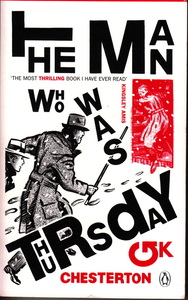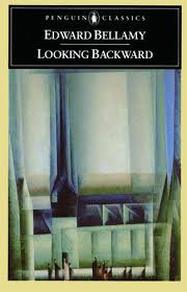
NumberOne.
The day after I got home for summer vacation I took a whack at G.K. Chesterton's famous novel, "The Man Who was Thursday." It is subtitled, "A Nightmare," and quite appropriately so, for it is an allegory of the chaos ensued by a people who rebel in the spirit of anarchy. For the most part, it was an enjoyable read with a few twists that were unexpected, and admittedly a few that I had seen coming about halfway through, but either way it was cleverly written and immensely thought-provoking.
It revealed something about humanity and the way man presents himself. Each character was eventually exposed as something other than they were thought to be, and each was hiding under a disguise that completely masked what their true influence and position in life was. Even the whole of mankind seemed to be turning into something other than it truly is.
However, the core of each character's identity was eventually brought to the surface, as is the always the case in those who try to hide their true character. The very essence of who we are cannot be suppressed, however hard we may try, and time and time again it is clear that there is something deeper in humanity than is often credited. There is something "god-like" at our core. We long for goodness, truth, and security, but we so often lose these things when we seek it in places it simply cannot be found. The "hope of humanity" lies in the fact that they were created in the image of God and so long to be united with their creator. It is the vain pursuit of the lost that is truly a nightmare...a nightmare that leads to a hidden and chaotic society. Perhaps this is not exactly what Chesterton was emphasizing, but it is the main message that I gathered, and in all honesty I see the effects of such truth each and every day in the mistakes of the sinful and the redeeming works of the righteous. We were made in the image of God, so we ought to start imaging Him.
The day after I got home for summer vacation I took a whack at G.K. Chesterton's famous novel, "The Man Who was Thursday." It is subtitled, "A Nightmare," and quite appropriately so, for it is an allegory of the chaos ensued by a people who rebel in the spirit of anarchy. For the most part, it was an enjoyable read with a few twists that were unexpected, and admittedly a few that I had seen coming about halfway through, but either way it was cleverly written and immensely thought-provoking.
It revealed something about humanity and the way man presents himself. Each character was eventually exposed as something other than they were thought to be, and each was hiding under a disguise that completely masked what their true influence and position in life was. Even the whole of mankind seemed to be turning into something other than it truly is.
However, the core of each character's identity was eventually brought to the surface, as is the always the case in those who try to hide their true character. The very essence of who we are cannot be suppressed, however hard we may try, and time and time again it is clear that there is something deeper in humanity than is often credited. There is something "god-like" at our core. We long for goodness, truth, and security, but we so often lose these things when we seek it in places it simply cannot be found. The "hope of humanity" lies in the fact that they were created in the image of God and so long to be united with their creator. It is the vain pursuit of the lost that is truly a nightmare...a nightmare that leads to a hidden and chaotic society. Perhaps this is not exactly what Chesterton was emphasizing, but it is the main message that I gathered, and in all honesty I see the effects of such truth each and every day in the mistakes of the sinful and the redeeming works of the righteous. We were made in the image of God, so we ought to start imaging Him.

NumberTwo.
The second book I am have been reading this week is "Looking Backward" by Edward Bellamy. This is a utopian novel written in the late 1800s by a very passionate socialist. It depicts life in a Boston in the year 2000 under a perfectly content and thriving American socialist nation. The main character went to sleep in 1887 and woke up in 2000, which is easily explained away of course, and naturally he has many questions about the now unfamiliar city he had been living in.
So far the book has been pretty enjoyable, with much less of the regular excitement and suspense of an adventure novel, but it is full of interesting ideas of what a perfect socialist nation could be. I am about half way through right now, and as hard as the author is trying to romanticize and idealize socialism, I'm not even close to being sold. There are so many holes in his explanations and I just don't see how the life described could be enjoyable. There is no sense of risk or success or fulfillment. Even things as enjoyable as cooking and musical concerts are done away with and replaced by more efficient and structured systems of "achieving" the same results that a day spent in the kitchen and a night at a concert would provide. It just seems like the journey there is lacking, as in so many other examples.
The author had no concept of the future of technology, at least thus far he doesn't. It is very interesting to see how a nineteenth century viewed the future and how little his expectations can even be compared to the reality of our current culture. It is also interesting the roles that women play in this utopia. They don't seem to have much of a purpose besides enjoying the efficiency of socialism. The men are the ones who play a part in the socialist system of profession. How different things are today...so different that this author could not even have imagined the sort of role women could play in a society that sought equality. The current vision of equality is extremely different than the nineteenth century socialist concept, but I would argue that is for the better.
I am interested to see where this book will end up and what sort of conclusions and suggestions the author has yet to make. I always will recommend utopian and dystopian literature, especially those written in the late 1800s and early 1900s. Others I have highly enjoyed include Player Piano, Brave New World, and of course 1984. A modern version of dystopian literature would be the Hunger Games.
I am also reading "So Long Insecurities" by Beth Moore. This book is gold. Read it, mark it up, read it again, and then lend it to a friend. Seriously, it is amazing. I think it would be well worth it for men to read it as well, so as to understand why us women are so nuts and why both genders react so incredulously at times.
Read On Friends! :)
The second book I am have been reading this week is "Looking Backward" by Edward Bellamy. This is a utopian novel written in the late 1800s by a very passionate socialist. It depicts life in a Boston in the year 2000 under a perfectly content and thriving American socialist nation. The main character went to sleep in 1887 and woke up in 2000, which is easily explained away of course, and naturally he has many questions about the now unfamiliar city he had been living in.
So far the book has been pretty enjoyable, with much less of the regular excitement and suspense of an adventure novel, but it is full of interesting ideas of what a perfect socialist nation could be. I am about half way through right now, and as hard as the author is trying to romanticize and idealize socialism, I'm not even close to being sold. There are so many holes in his explanations and I just don't see how the life described could be enjoyable. There is no sense of risk or success or fulfillment. Even things as enjoyable as cooking and musical concerts are done away with and replaced by more efficient and structured systems of "achieving" the same results that a day spent in the kitchen and a night at a concert would provide. It just seems like the journey there is lacking, as in so many other examples.
The author had no concept of the future of technology, at least thus far he doesn't. It is very interesting to see how a nineteenth century viewed the future and how little his expectations can even be compared to the reality of our current culture. It is also interesting the roles that women play in this utopia. They don't seem to have much of a purpose besides enjoying the efficiency of socialism. The men are the ones who play a part in the socialist system of profession. How different things are today...so different that this author could not even have imagined the sort of role women could play in a society that sought equality. The current vision of equality is extremely different than the nineteenth century socialist concept, but I would argue that is for the better.
I am interested to see where this book will end up and what sort of conclusions and suggestions the author has yet to make. I always will recommend utopian and dystopian literature, especially those written in the late 1800s and early 1900s. Others I have highly enjoyed include Player Piano, Brave New World, and of course 1984. A modern version of dystopian literature would be the Hunger Games.
I am also reading "So Long Insecurities" by Beth Moore. This book is gold. Read it, mark it up, read it again, and then lend it to a friend. Seriously, it is amazing. I think it would be well worth it for men to read it as well, so as to understand why us women are so nuts and why both genders react so incredulously at times.
Read On Friends! :)
 RSS Feed
RSS Feed